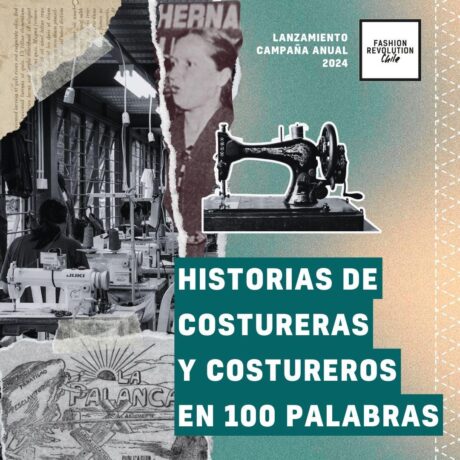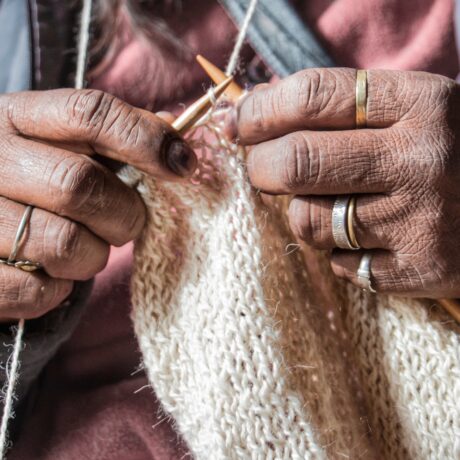Transparent Fashion Supply Chains as a Tool to Reduce Migration in Rural Ecuador
We don’t know the true cost of the things we buy. The fashion industry supply chain is fractured and producers have become faceless. This is costing lives. Not just the mass loss of life we hear about when another disaster hits a garment factory, but the lives of individual artisans and garment workers who cannot support themselves in their own community and undertake perilous journeys in search of a better life.
Hundreds of thousands of migrant garment workers are employed throughout the fashion and textiles suppy chain, many of whom live in constant fear as they are working illegally. “They took us to the airport and left us there for three days. We couldn’t travel, because we didn’t have tickets. Armed gunmen, who we were told were from the armed forces, threatened us. We feared we would be shot if we continued to protest. We were then rounded up in a camp” reported a garment factory worker in Mauritius to the Clean Clothes Campaign.
Legal migration can be a spur for development, but in many cases, particularly when people move illegally, migrants face harassment and violence and often increased poverty. The fashion industry has the potential to generate sustainable livelihoods for artisans and garment workers around the world wherever they live, but this can only be done through fully traceable and transparent supply chains, backed up with regular monitoring.

The current lack of transparency in fashion supply chains makes it virtually impossible for consumers to know who made their clothes and accessories. Without knowing #whomademyclothes, how can we know in what conditions they were made?
At Pachacuti, we believe fashion needs to rediscover a traceable narrative. We have worked for three years as a pilot on the EU Geo Fair Trade project which has brought an unprecedented level of traceability to our supply chain. The project aims to provide visible accountability of sustainable provenance, both for raw materials as well as production processes.
This level of traceability data is far from easy to collect – it cannot be achieved by a few clicks on the computer – but it is essential to guarantee that our supply chain is as transparent as we can possibly make it. Despite the remoteness and inaccessibility of the region of Azuay where our Panama hats are woven, we traced the production of our hats back to the GPS co-ordinates of 154 of our weavers’ houses – not easy data to collect when only 45% of homes were accessible by road, located high in the Andes.
But it doesn’t stop there. Not content with tracing our Panama hats back to where they were woven, we then traced the straw back to the communities on the coast of Ecuador in Guayas province where it is processed. Next, a bumpy hour by truck from the nearest paved road, we mapped the GPS coordinates of each plot of land in the coastal cloud forest where the straw is harvested on community-owned plantations. The community has been working hard to protect their area of land and to increase sustainability and biodiversity in the area. They are now seeing a lot more toucans, armadillos and monkeys in the plantation.
Once established, the carludovica palmata plant can be cropped monthly for 100 years – surely one of the most sustainable sources of raw material imaginable. The plants also help to a prevent erosion and improve air quality. Our straw is gathered by 32 harvesters who form the Love and Peace Association – maybe a rather incongruous name for men who spend most of their lives wielding a machete! The straw harvesters are keen to point out:“We are producting oxygen for the world”
Our research for the Geo Fair Trade project took three years, including a 6 month period in Ecuador and four other field trips in order to collect social, economic and environmental indicators and track our Panama hats to their source. Our weavers are delighted that this research data helps correct a historical misnomer and Pachacuti’s panama hats can now be tracked back to their country of origin – Ecuador!
But geographic traceability is just one element of creating a transparent supply chain. Transparency also implies openness, honesty, communication and accountability. Regular, ongoing monitoring of the supply chain to measure both the social and environmental impact is essential if we are to claim that our products are truly sustainable.
In 2012 UNESCO declared that the art of weaving a Panama hat in Ecuador would be added to their list of Intangible Cultural Heritage. Intangible Cultural Heritage is a term used for knowledge, traditions and rituals which permeate the everyday life of a community, passed down through generations and forming an intrinsic part of their identity and culture.
However, the historic exploitation of weavers by middlemen means that this timeless skill is under threat as young people are searching for alternatives. This has led to the small, rural community where we work in Ecuador having one of the highest levels of migration in the country, with 60% of children having at least one parent living overseas. The destruction of family and community life has led to high rates of alcoholism, double the national rate of youth suicides and teen pregnancies are the norm.
We have heard so many desperately sad stories of people, including the children of our weavers, who are paying coyotes, human traffickers, to take them on the dangerous journey through Central America and Mexico, across the border to the United States. One of our weavers has a 15 year old daughter who walked most of the way from Ecuador to Mexico before paying a coyote to cross the remote, desert border. In the village where we work, almost the entire younger generation has migrated and women outnumber men by 7 to 1. In interviews conducted with our weavers, most of them had children living overseas and several of them did not even know in which country their children lived. Many emigrants will work for years to pay back the traffickers, often returning penniless to their own country.
Unlike the journey taken by most Panama Hats in the world, which pass through the hands of around seven different intermediaries (known as ‘perros’ or dogs due to their unscrupulous purchasing practices) Pachacuti works directly with our artisans in every step of the process, weaving, dyeing, blocking, finishing, to ensure that as much of the final value as possible remains in their hands.
Our work on the EU Geo Fair Trade project involved the collection of 68 social, economic and environmental indicators which enabled us to measure our Fair Trade impact, tracking progress over a three year period. We also piloted the WFTO Sustainable Fair Trade Management System and Fair Trade Guarantee System. Prices are monitored through interviews with a sample group of weavers to ascertain a local living wage. The price is also measured against the government’s cañasta básica vital, the monthly market price of meeting basic needs for a family of 4 and we ensure that the prices we pay are rising at a higher rate of inflation. We provide ongoing training and investment, not just in design development and skills, but in self-esteem, human relations, building a nursery, costing of products and overheads and health and safety.
Since 1992, we have worked to preserve and encourage traditional hat weaving skills in Ecuador but, despite our efforts, hat weaving is still in steep decline in the wider community and the average age of our weavers is 58. As well as working to ensure this way of life is viable for future generations, last year we provided a substantial interest-free loan to help establish a new organisation to work specifically with younger weavers.
The art of creating Panama Hats is woven into the fabric of daily life in rural Ecuador: women weave on the bus, walking to market, on their way to the fields. For the women who weave Pachacuti Panama hats, weaving is more than an art, more than a skill, it is a way of life and represents the cultural heritage of an entire community. Will the art of panama hat weaving die out as young people abandon traditional, rural ways of life and migrate to the city, or emigrate in pursuit of the American dream? Or can Panama hat weaving provide a sustainable form of income to enable women to remain within their rural communities, keeping families together, and passing on their culture and traditions. Pachacuti is working to prove that the a better Panama hat industry is possible.
Fashion Revolution aims to raise awareness of the effect of our purchasing decisions on the livelihoods of garment and accessories producers and their communities. We believe that transparency is the first step in transforming the industry and is a way to bring wider recognition to the many skilled artisans within the fashion supply chain. This, in turn, will help ensure their work is properly valued and justly remunerated in the future.
If you want to help build more open and connected fashion supply chains, take a selfie and contact the brand on social media to ask #whomademyclothes?














